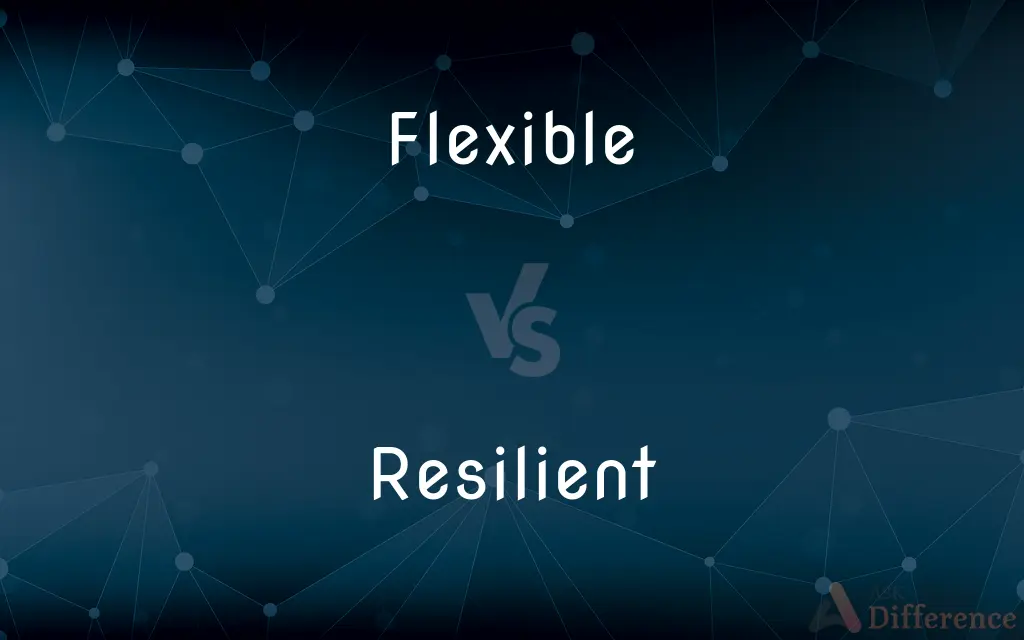Flexible vs. Resilient — What's the Difference?
Edited by Tayyaba Rehman — By Fiza Rafique — Updated on April 4, 2024
Flexibility refers to the ability to adapt or bend without breaking, often highlighting versatility, while resilience denotes the capacity to recover quickly from difficulties, emphasizing strength and endurance.

Difference Between Flexible and Resilient
Table of Contents
ADVERTISEMENT
Key Differences
Flexibility is a trait that encompasses the ability to adapt to new, changing, or challenging situations with ease. It involves bending ideas, preferences, and even plans to accommodate different circumstances. Flexibility is valuable in problem-solving, as it allows for creative and adaptable solutions. On the other hand, resilience is about withstanding and bouncing back from challenges, stresses, and setbacks. It’s a measure of how quickly someone can return to their original state or grow from the experience, highlighting an inner strength and the ability to endure and overcome adversity.
While flexibility is about adaptation and change, resilience focuses on recovery and endurance. A flexible person can easily adjust their methods, ideas, or expectations in response to external conditions. Conversely, a resilient individual might maintain their course in the face of difficulty, relying on their inner strength to overcome challenges. Resilience is not just about surviving; it's about thriving and growing despite obstacles, demonstrating an ability to push through hardship and emerge stronger.
Flexibility can often lead to resilience, as being adaptable in the face of change can build the skills and mindset necessary to recover from setbacks. Flexibility allows individuals to explore different pathways and solutions, reducing the impact of challenges. Whereas resilience is built through experiencing and overcoming adversity, teaching individuals to navigate future obstacles more effectively. Resilience is characterized by persistence, optimism, and a positive outlook, even in difficult times.
In the context of work and personal life, flexibility is often seen as a desirable trait for navigating daily changes and challenges, promoting a harmonious balance and reducing stress. It enables individuals to adjust to new roles, responsibilities, and environments efficiently. Meanwhile, resilience is crucial for long-term success and well-being, empowering individuals to face stress, failures, and crises with confidence and strength. It’s about maintaining stability and optimism in the face of life’s uncertainties.
The relationship between flexibility and resilience is complementary. Flexibility can enhance resilience by providing a broader range of strategies for dealing with stress and adversity. In turn, being resilient can make it easier to be flexible, as overcoming challenges often requires adapting and finding new ways to move forward. Both qualities are essential for personal development, mental health, and achieving goals, illustrating different but interconnected aspects of coping and thriving in a complex world.
ADVERTISEMENT
Comparison Chart
Definition
Ability to adapt or change easily
Capacity to recover quickly from difficulties
Key Characteristic
Adaptability and openness to change
Strength and endurance in adversity
Focus
Process of adapting
Outcome of bouncing back
Involves
Changing methods, ideas, expectations
Maintaining or regaining stability
Outcome
Creative and adaptable solutions
Overcoming and growing from challenges
Role in Problem-Solving
Offers multiple pathways and solutions
Provides determination to persist and overcome
Importance
Reduces the impact of challenges
Ensures long-term success and well-being
Compare with Definitions
Flexible
Willing to change or compromise.
A flexible negotiator can help resolve disputes effectively.
Resilient
Showing tenacity and persistence.
Her resilient attitude helped her overcome many obstacles.
Flexible
Capable of being bent easily without breaking.
Yoga practitioners are often very flexible.
Resilient
Able to withstand or recover quickly from difficult conditions.
Resilient people don't let failure defeat them.
Flexible
Open to change and variety.
Being flexible with your travel plans can lead to unexpected adventures.
Resilient
Maintaining optimism in face of challenges.
A resilient mindset keeps you positive during tough times.
Flexible
Versatile and easily adjusted.
A flexible budget can adapt to unforeseen expenses.
Resilient
Capable of springing back into shape after bending, stretching, or being compressed.
Rubber bands are resilient materials.
Flexible
Able to be adapted to new, different, or changing requirements.
Flexible work hours accommodate employees' needs.
Resilient
Recovering from adversity with increased strength and wisdom.
He became more resilient after each setback.
Flexible
Capable of bending easily without breaking
Flexible rubber seals
Resilient
Capable of returning to an original shape or position, as after having been compressed.
Flexible
Capable of being bent or flexed; pliable
A flexible hose.
Resilient
Able to recover readily, as from misfortune.
Flexible
Readily bending or twisting the body without injury
You can play soccer much better if you're flexible.
Resilient
Returning quickly to original shape after force is applied; elastic.
Flexible
Able to change to cope with variable circumstances
"a flexible and quietly competent administrator" (Jerome Karabel).
Resilient
(materials science) Having the ability to absorb energy when deformed.
Flexible
Capable of being changed or adjusted to meet particular or varied needs
A job with flexible hours.
A flexible definition of normality.
Resilient
Returning quickly to normal after damaging events or conditions.
Flexible
Capable of being flexed or bent without breaking; able to be turned or twisted without breaking.
Resilient
Having the ability to recover from mental illness, trauma, etc.; having resilience.
Flexible
Willing or prone to give way to the influence of others; not invincibly rigid or obstinate.
Resilient
Leaping back; rebounding; recoiling.
Flexible
Capable or being adapted or molded in some way.
A flexible language
Resilient
Recovering readily from adversity, depression, or the like
Flexible
Something that is flexible.
Resilient
Rebounds readily;
Clean bouncy hair
A lively tennis ball
As resiliant as seasoned hickory
Springy turf
Flexible
Capable of being flexed or bent; admitting of being turned, bowed, or twisted, without breaking; pliable; yielding to pressure; not stiff or brittle.
When the splitting windMakes flexible the knees of knotted oaks.
Flexible
Willing or ready to yield to the influence of others; not invincibly rigid or obstinate; tractable; manageable; ductile; easy and compliant; wavering.
Phocion was a man of great severity, and no ways flexible to the will of the people.
Women are soft, mild, pitiful, and flexible.
Flexible
Capable or being adapted or molded; plastic,; as, a flexible language.
This was a principle more flexible to their purpose.
Flexible
Extended meanings; capable of change;
A flexible character
Flexible schedules
Flexible
Able to flex; able to bend easily;
Slim flexible birches
Flexible
Able to adjust readily to different conditions;
An adaptable person
A flexible personality
An elastic clause in a contract
Flexible
Bending and snapping back readily without breaking
Flexible
Making or willing to make concessions;
Loneliness tore through him...whenever he thought of...even the compromising Louis du Tillet
Common Curiosities
Are flexibility and resilience innate or learned traits?
Both traits can be innate to some degree but can also be significantly developed through experiences and conscious effort.
Can too much flexibility be a disadvantage?
Excessive flexibility might lead to a lack of consistency or commitment. Balance is key to effectively using flexibility.
How can I become more resilient?
Building resilience involves facing challenges, maintaining a positive outlook, learning from experiences, and seeking support when needed.
Is resilience the same as resistance?
No, resistance is about withstanding pressures without changing, while resilience is about recovering and growing from challenges.
Why is resilience important in relationships?
Resilience helps individuals and relationships withstand and grow from the inevitable challenges and conflicts that occur.
Can someone be flexible but not resilient?
Yes, someone might adapt easily to change but struggle to recover from significant setbacks or adversity.
Can organizations be flexible and resilient?
Yes, organizations that adapt to market changes and recover from setbacks efficiently are both flexible and resilient, key traits for long-term success.
How does resilience affect mental health?
Resilience is protective against mental health challenges, as it helps individuals navigate stress, bounce back from hardship, and grow from their experiences.
How do flexibility and resilience complement each other?
Flexibility allows for easier adaptation to change, which can reduce the impact of stress and challenges, thereby building resilience.
Can practicing mindfulness improve flexibility and resilience?
Yes, mindfulness can enhance flexibility by promoting openness to experiences and resilience by improving emotional regulation and perspective.
Share Your Discovery

Previous Comparison
Merchandised vs. Merchandiser
Next Comparison
Hail vs. HellAuthor Spotlight
Written by
Fiza RafiqueFiza Rafique is a skilled content writer at AskDifference.com, where she meticulously refines and enhances written pieces. Drawing from her vast editorial expertise, Fiza ensures clarity, accuracy, and precision in every article. Passionate about language, she continually seeks to elevate the quality of content for readers worldwide.
Edited by
Tayyaba RehmanTayyaba Rehman is a distinguished writer, currently serving as a primary contributor to askdifference.com. As a researcher in semantics and etymology, Tayyaba's passion for the complexity of languages and their distinctions has found a perfect home on the platform. Tayyaba delves into the intricacies of language, distinguishing between commonly confused words and phrases, thereby providing clarity for readers worldwide.














































